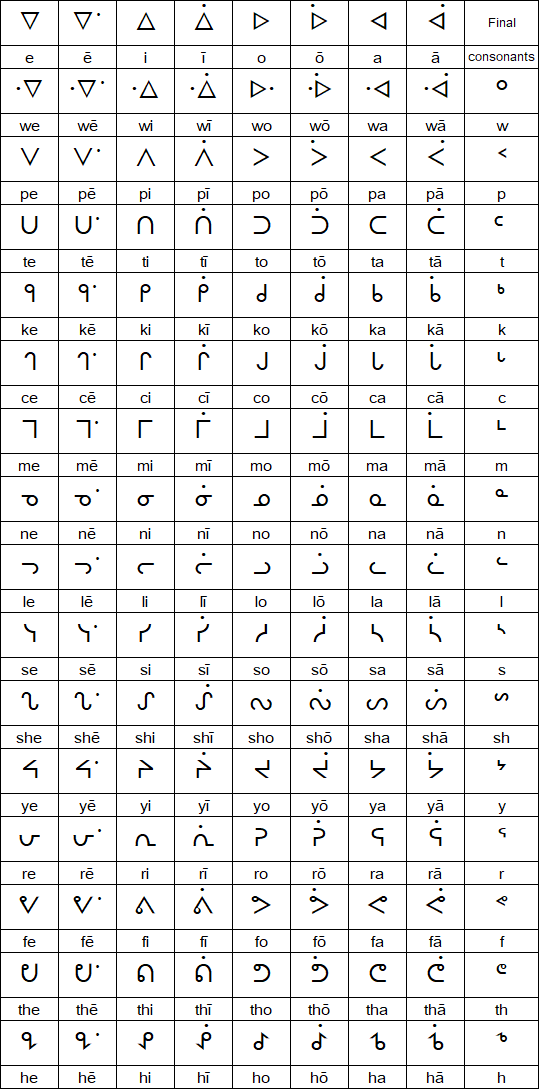Canadian Aboriginal Syllabics is the collective name for the syllabic writing systems developed from James Evans' Ojibwe syllabary, which he invented in 1840.
They are used to write a number of the indigenous languages of Canada, including:
Blackfoot (ᑯᖾᖹ [Pikuni] / ᖿᐟᖻᐟ [Kainai] / ᓱᖽᐧᖿ [Siksika]), an Algonquian language with about 9,000 speakers in southern Alberta, Canada and in the USA.
Carrier (ᑕᗸᒡ [Dakelh]), a number of Athabascan languages spoken by about 11,655 people in central British Columbia, Canada.
Cree (ᓀᐦᐃᔭᐍᐏᐣ [Nēhiyawēwin]) a number of Algonquian languages spoken by about 70,000 people in Canada, especially in Ontario, Manitoba, Saskatchewan and Alberta.
Naskapi (ᓇᔅᑲᐱ [Innu Aimun]), an Algonquian language closely related to Cree with about 400 speakers in Schefferville and Davis Inlet on the Labrador coast of Canada.
Inuktitut (ᐃᓄᒃᑎᑐᑦ), an Eskimo-Aleut language spoken in Greenland Canada, Alaska and Siberia by about 65,000 people.
Ojibwe (ᐊᓂᔑᓇᐯᒧᐎᐣ [Anishinaabemowin]), an Algonquian language spoken on by about 50,000 people in the Canadian provinces of Ontario, Manitoba and Saskatchewan, and by about 30,000 people in the US states of Michigan, Wisconsin, Minnesota, Montana and North Dakota.
Slavey, an Athabascan language spoken by about 4,000 people in northern Alberta, north-eastern British Columbia and the Northwest Territories of Canada.

Download script chart for Canadian Aboriginal Syllabics (Excel)
Information about Canadian Aboriginal Syllabics
https://en.wikipedia.org/wiki/Canadian_Aboriginal_syllabics
https://r12a.github.io/scripts/cans/
https://www.endangeredalphabets.net/alphabets/canadian-aboriginal-syllabics/
Canadian Aboriginal Syllabics transliteration
https://www.translitteration.com/transliteration/en/inuktitut/canadian-aboriginal-syllabics/
https://www.translitteration.com/transliteration/en/carrier/canadian-aboriginal-syllabics/
Page last modified: 23.06.21
[top]
You can support this site by Buying Me A Coffee, and if you like what you see on this page, you can use the buttons below to share it with people you know.

If you like this site and find it useful, you can support it by making a donation via PayPal or Patreon, or by contributing in other ways. Omniglot is how I make my living.
Note: all links on this site to Amazon.com, Amazon.co.uk
and Amazon.fr
are affiliate links. This means I earn a commission if you click on any of them and buy something. So by clicking on these links you can help to support this site.
[top]